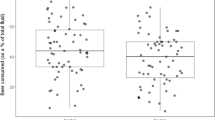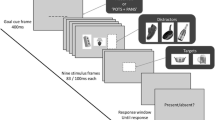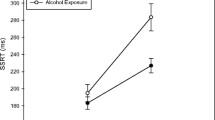Abstract
Rationale
Poor behavioral control and heightened attentional bias toward alcohol-related stimuli have independently received considerable attention in regard to their roles in alcohol abuse. Theoretical accounts have begun to speculate as to potential reciprocal interactions between these two mechanisms that might promote excessive alcohol consumption, yet experimental evidence is lacking.
Objectives
The objective of the study was to integrate these two lines of research through the development of a novel laboratory task that examines the degree to which alcohol cues serve to disrupt mechanisms of behavioral control.
Methods
Fifty adult drinkers were recruited to perform the attentional bias–behavioral activation (ABBA) task. The ABBA task, an adaptation of traditional cued go/no-go tasks, is a reaction time model that measures the degree to which alcohol-related stimuli can increase behavioral activation of a drinker and reduce the ability to inhibit inappropriate responses. Participants also completed a novel measure of attentional bias, the scene inspection paradigm (SIP), that measures fixation time on alcohol content imbedded in complex scenes.
Results
As hypothesized, the proportion of inhibitory failures on the ABBA task was significantly higher following alcohol images compared to neutral images. Correlational analyses showed that heightened attentional bias on the SIP was associated with greater response activation following alcohol images on the ABBA task.
Conclusions
These findings suggest that alcohol stimuli serve to disrupt mechanisms of behavioral control, and that heightened attentional bias is associated with greater disruption of control mechanisms following alcohol images.


Similar content being viewed by others
References
Bjork JM, Hommer DW, Grant SJ, Danube C (2004) Impulsivity in abstinent alcohol-dependent patients: relation to control subjects and type 1-/type 2-like traits. Alcohol 34:133–50
Ceballos NA, Komogortsev OV, Turner GM (2009) Ocular imaging of attentional bias among college students: automatic and controlled processing of alcohol-related scenes. J Stud Alcohol Drugs 70:652–9
Chanon VW, Sours CR, Boettiger CA (2010) Attentional bias toward cigarette cues in active smokers. Psychopharmacology 212:309–20. doi:10.1007/s00213-010-1953-1
Dawe S, Gullo MJ, Loxton NJ (2004) Reward drive and rash impulsiveness as dimensions of impulsivity: implications for substance misuse. Addict Behav 29:1389–405. doi:10.1016/j.addbeh.2004.06.004
Dunning JP, Parvaz MA, Hajcak G, Maloney T, Alia-Klein N, Woicik PA, Telang F, Wang GJ, Volkow ND, Goldstein RZ (2011) Motivated attention to cocaine and emotional cues in abstinent and current cocaine users—an ERP study. Eur J Neurosci 33:1716–23. doi:10.1111/j.1460-9568.2011.07663.x
Fadardi JS, Cox WM (2008) Alcohol-attentional bias and motivational structure as independent predictors of social drinkers’ alcohol consumption. Drug Alcohol Depend 97:247–56. doi:10.1016/j.drugalcdep. 2008.03.027
Field M, Cox WM (2008) Attentional bias in addictive behaviors: a review of its development, causes, and consequences. Drug Alcohol Depend 97:1–20
Field M, Christiansen P, Cole J, Goudie A (2007) Delay discounting and the alcohol Stroop in heavy drinking adolescents. Addiction 102:579–86. doi:10.1111/j.1360-0443.2007.01743.x
Field M, Wiers RW, Christiansen P, Fillmore MT, Verster JC (2010) Acute alcohol effects on inhibitory control and implicit cognition: implications for loss of control over drinking. Alcohol Clin Exp Res 34:1346–52. doi:10.1111/j.1530-0277.2010.01218.x
Fillmore MT (2001) Cognitive preoccupation with alcohol and binge drinking in college students: alcohol-induced priming of the motivation to drink. Psychol Addict Behav 15:325–32
Fillmore MT (2003) Drug abuse as a problem of impaired control: current approaches and findings. Behav Cogn Neurosci Rev 2:179–97. doi:10.1177/1534582303257007
Fillmore MT (2007) Acute alcohol-induced impairment of cognitive functions: past and present findings. Inter J of Dis and Hum Devel 6:115–125
Finn PR, Kessler DN, Hussong AM (1994) Risk for alcoholism and classical conditioning to signals for punishment: evidence for a weak behavioral inhibition system? J Abnorm Psychol 103:293–301
Fowles DC (1987) Application of a behavioral theory of motivation to the concepts of anxiety and impulsivity. J Res Pers 21:417–435
Franken IH (2003) Drug craving and addiction: integrating psychological and neuropsychopharmacological approaches. Prog Neuro-Psychopharmacol Biol Psychiatry 27:563–79. doi:10.1016/s0278-5846(03)00081-2
Goldstein RZ, Volkow ND (2002) Drug addiction and its underlying neurobiological basis: neuroimaging evidence for the involvement of the frontal cortex. Am J Psychiatry 159:1642–52
Gray JA (1976) The behavioral inhibition system: a possible substrate for anxiety. In: Feldman MP, Broadhurst A (eds) Theoretical and experimental bases of the behavior therapies. Wiley, London, pp 3–41
Jentsch JD, Taylor JR (1999) Impulsivity resulting from frontostriatal dysfunction in drug abuse: implications for the control of behavior by reward-related stimuli. Psychopharmacology 146:373–90
Jones BT, Bruce G, Livingstone S, Reed E (2006) Alcohol-related attentional bias in problem drinkers with the flicker change blindness paradigm. Psychol Addict Behav 20:171–7. doi:10.1037/0893-164x.20.2.171
Logan GD, Cowan WB (1984) On the ability to inhibit thought and action: a theory of an act of control. Psychol Rev 91:295–327
Lyvers M (2000) “Loss of control” in alcoholism and drug addiction: a neuroscientific interpretation. Exp Clin Psychopharmacol 8:225–49
Marczinski CA, Combs SW, Fillmore MT (2007) Increased sensitivity to the disinhibiting effects of alcohol in binge drinkers. Psychol Addict Behav 21:346–54. doi:10.1037/0893-164x.21.3.346
McGraw KO, Wong SP (1996) Forming inferences about some intraclass correlation coefficients. Psychol Methods 1:30–43
McKim WA (2007) Drugs and behavior: an introduction to behavioral pharmacology, 6th edn. Pearson Prentice Hall, New Jersey
Miller MA, Fillmore MT (2010) The effect of image complexity on attentional bias towards alcohol-related images in adult drinkers. Addiction 105:883–90. doi:10.1111/j.1360-0443.2009.02860.x
Miller MA, Fillmore MT (2011) Persistence of attentional bias toward alcohol-related stimuli in intoxicated social drinkers. Drug Alcohol Depend 117:184–9. doi:10.1016/j.drugalcdep. 2011.01.016
Murphy P, Garavan H (2011) Cognitive predictors of problem drinking and AUDIT scores among college students. Drug Alcohol Depend 115:94–100. doi:10.1016/j.drugalcdep. 2010.10.011
National Institute on Alcohol Abuse and Alcoholism. (2004) NIAAA council approves definition of binge drinking. NIAAA Newsletter, 3, Winter 2004
Nederkoorn C, Baltus M, Guerrieri R, Wiers RW (2009) Heavy drinking is associated with deficient response inhibition in women but not in men. Pharmacol Biochem Behav 93:331–6. doi:10.1016/j.pbb.2009.04.015
Noel X, Van der Linden M, D’Acremont M, Bechara A, Dan B, Hanak C, Verbanck P (2007) Alcohol cues increase cognitive impulsivity in individuals with alcoholism. Psychopharmacology 192:291–298
Patton JH, Stanford MS, Barratt ES (1995) Factor structure of the Barratt impulsiveness scale. J Clin Psychol 51:768–774
Robinson TE, Berridge KC (1993) The neural basis of drug craving: an incentive-sensitization theory of addiction. Brain Res Rev 18:247–91
Robinson TE, Berridge KC (2001) Incentive-sensitization and addiction. Addiction 96:103–14. doi:10.1080/09652140020016996
Rose AK, Duka T (2008) Effects of alcohol on inhibitory processes. Behav Pharmacol 19:284–91. doi:10.1097/FBP.0b013e328308f1b2
Rubio G, Jimenez M, Rodriguez-Jimenez R, Martinez I, Avila C, Ferre F, Jimenez-Arriero MA, Ponce G, Palomo T (2008) The role of behavioral impulsivity in the development of alcohol dependence: a 4-year follow-up study. Alcohol Clin Exp Res 32:1681–7. doi:10.1111/j.1530-0277.2008.00746.x
Ryan F (2002) Detected, selected, and sometimes neglected: cognitive processing of cues in addiction. Exp Clin Psychopharmacol 10:67–76
Schoenmakers T, Wiers RW, Field M (2008) Effects of a low dose of alcohol on cognitive biases and craving in heavy drinkers. Psychopharmacology 197:169–78. doi:10.1007/s00213-007-1023-5
Sharma D, Albery IP, Cook C (2001) Selective attentional bias to alcohol related stimuli in problem drinkers and non-problem drinkers. Addiction 96:285–95. doi:10.1080/09652140020021026
Sobell LC, Sobell MB (1992) Timeline follow-back: a technique for assessing self-reported alcohol consumption. In: Litten RZ, Allen JP (eds) Measuring alcohol consumption: psychosocial and biochemical methods. Humana Press, Totowa, pp 41–72
Stacy AW, Wiers RW (2010) Implicit cognition and addiction: a tool for explaining paradoxical behavior. Annu Rev Clin Psychol 6:551–75. doi:10.1146/annurev.clinpsy.121208.131444
Tibboel H, De Houwer J, Field M (2010) Reduced attentional blink for alcohol-related stimuli in heavy social drinkers. J Psychopharmacol 24:1349–56. doi:10.1177/0269881109106977
Townshend JM, Duka T (2001) Attentional bias associated with alcohol cues: differences between heavy and occasional social drinkers. Psychopharmacology 157:67–74
Waters AJ, Marhe R, Franken IH (2012) Attentional bias to drug cues is elevated before and during temptations to use heroin and cocaine. Psychopharmacology 219:909–21. doi:10.1007/s00213-011-2424-z
Watson PE, Watson ID, Batt RD (1981) Prediction of blood alcohol concentrations in human subjects. Updating the Widmark equation. J Stud Alcohol 42:547–56
Weafer J, Fillmore MT (2008) Individual differences in acute alcohol impairment of inhibitory control predict ad libitum alcohol consumption. Psychopharmacology 201:315–324. doi:10.1007/s00213-008-1284-7
Weafer J, Fillmore MT (under review). Acute alcohol effects on attentional bias in heavy and moderate drinkers
Weafer J, Milich R, Fillmore MT (2011) Behavioral components of impulsivity predict alcohol consumption in adults with ADHD and healthy controls. Drug Alcohol Depend 113:139–46. doi:10.1016/j.drugalcdep. 2010.07.027
Acknowledgment
This research was supported by the National Institute on Alcohol Abuse and Alcoholism Grants R01 AA018274, R01 AA012895, and F31 AA018584.
Conflicts of interest
The authors have no conflict of interest to declare.
Author information
Authors and Affiliations
Corresponding author
Rights and permissions
About this article
Cite this article
Weafer, J., Fillmore, M.T. Alcohol-related stimuli reduce inhibitory control of behavior in drinkers. Psychopharmacology 222, 489–498 (2012). https://doi.org/10.1007/s00213-012-2667-3
Received:
Accepted:
Published:
Issue Date:
DOI: https://doi.org/10.1007/s00213-012-2667-3




